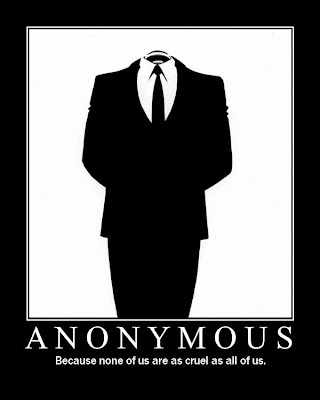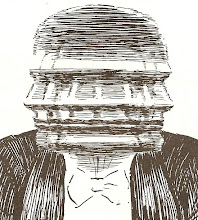
As a bit of a follow-up to my last post about net anonymity . . .
"You can claim anonymity, but there is a range of things that a judge will use to determine whether you have used your anonymity responsibly" [my emphasis]
That's a provocative quote from this article about recent legal decisions unmasking people's internet anonymity, and the precedents being set. What's also interesting about the article, though, is its discussion of how and why this might not even matter.
See, the article argues that the rise of social networking (among other things) is undermining net anonymity on a basic, socio-cultural level. In the future, apparently, we'll almost always be authenticated & named on the net – just as usually we are on Facebook and in real life. Correspondingly, future internet forums & chats will be much nicer than they are now, because if we're identified then we're responsible for what we say – just as we are in real life. The article points out that, for example, nasty anonymous twitterers are never popular. Only the authentically real (or known fake) identities maintain an audience.
"It might be entertaining to post anonymously, but it's not very interesting to read . . . When people are going to be named, whether it's their real name or a persistent pseudonym, it takes them more of an effort to maintain the credibility of their name." [my emphasis]
Interesting, huh? Does it sound plausible to you?
More importantly – does using your real name make you a nicer person? And is that a good thing, or a bad thing?
Enjoy yr weekend, folks :)

personally i think it wouldnt be as fun posting anonymously. i want to take credit for what i post. if i didnt want to take credit, i wouldnt want to post it.
ReplyDeleteon a side note, i dont think using your real name makes you a nicer person, but it does make you a person. someone people can relate to, whether they agree or disagree with what you say. without a name, you're just ugly words.
Yeah, I think your side note is a really good point ... words probably do have more power when they're coming from a recognisably real name, from a signature-title-label-representation-thing that we can't help imagining & treating more like a real person. Maybe that's the key: by using real names, we can more easily trigger people's empathy and consideration, to make the communication seem more like a real-life interaction and less like empty game-text.
ReplyDeleteUnfortunately, I think abolishing anonymous blogging would clean up a lot of web content, and dissuade people from being cyber bullies. As I suggested in my recent post, a major reason cyber bullies think they can get away with unnecessary and nasty comments is because they think their true identity will not be revealed. If supplying a name was compulsory, I think the web world would be filled with nicer people. So yes, this does disappoint me, and it’s a bad thing that there are people out there who are willing to say mean things, based on the fact that their identity will be concealed.
ReplyDeleteEliminating anonymous blogging will also make people accountable for their actions, and as I mentioned in my blog, I believe more cases like the model suing Google will come to light…especially in American, where people seem to be sued for a lot of weird things.
@ asedger:
ReplyDeleteI guess the trick is finding a balance ... anonymity can be the only way for people to safely distribute sensitive information (say, if you're living under a military dictatorship), so you definitely don't want to make anonymity impossible (or even, especially difficult).
I agree that niceness is generally good and "saying mean things" is generally not so good, but I'm wary of ever using that as an actual rationale or reason for non-anonymity. The distinction between "valid criticisms" and "mean things" is a very tricky line to draw.
Is the elimination/reduction of cyberbullying and cyber-nastiness worth compulsory identification?
I'm inclined to think No.
(Sticks and stones, what doesn't kill me, don't feed trolls, etc.)
What do you think?
Blogging was created as a way for people to freely express their opinions and communicate without fear of repercussion. I therefore don't think blogging or other forms of online communication should be censored, but I also think it's pretty easy to draw the line between "mean things" and "valid criticisms". For example, calling someone a pathetic slag who should give up her modelling career, versus suggesting that the model pursue another career, are two completely different things, and it's pretty easy to define where bullying starts and criticism ends.
ReplyDeleteI don't want the internet to become a place that fosters bullying; there's certainly enough of that in school, at work, in everyday social situations. However, I'm also inclined to think no, the internet shouldn't be censored, but I do think people should be prepared to take responsibility for their actions, should the law deem these inappropriate or wrong.
I think being forced to reveal true identity online wouldn’t necessarily be instrumental in making someone be nicer. Even in real life, somebody can seem nice on the outside but be having dark judgemental thoughts they do not express in words. It is an unrealistic concept. In addition being nice can also be used a way of being mean … which is much more cruel, in my opinion.
ReplyDeleteHowever it might be a way of getting people who originally didn’t bother to do so to act nicer. To me, I’d prefer someone being genuinely mean rather than acting nice to score points. Others might be OK with enforced niceness though.
Yeah, Sarasi, I think I agree with you . . . I'd much rather that people be honest with me, even if it means that they're "mean" and harsh (i.e. "genuinely mean", as you say). But I don't think I take offence easily, so the idea of anonymous people saying cruel things just doesn't bother me, personally.
ReplyDeleteIf the "cruel" anonymous criticisms are valid, then I do want to hear them (however "mean" they seem) - and if I honestly don't think they're valid, then why should I be bothered? I know I'm not what people say about me.
That said, I can also see how concerted bullying campaigns - when people are relentlessly, endlessly cruel, on and on and on - can be horrifically unpleasant and unfair, and certainly outside the realm of fair comment or criticism. I think maybe that's what Alex is getting at with his comments about bullying, above.
I suppose since I haven't had a negative online experience, I cant imagine how I would feel. But, how old are we? "Sticks and stones may break my bones but names will never hurt me". There should be a way to block users that you don't want reading or commenting on your site. Any ideas on how we make that happen web gurus?
ReplyDelete